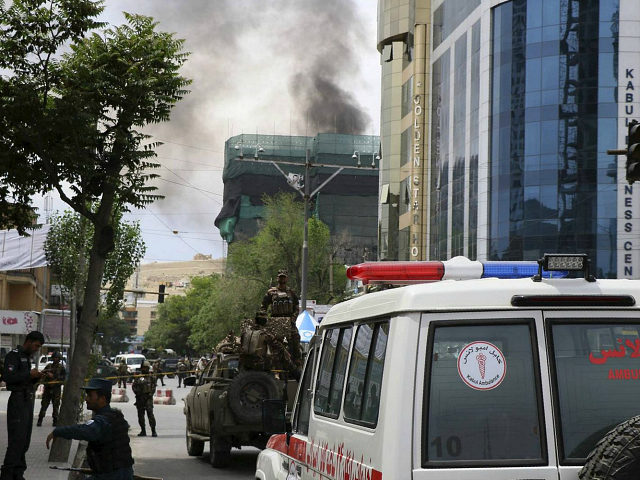The Afghan Taliban on Friday rejected reports that they had agreed to a repeat of last year’s unprecedented three-day ceasefire in honor of the Eid al-Fitr holiday that marks the end of the Muslim holy month of Ramadan, noting the audio message about the truce is related to last year’s cessation of hostilities.
“This is not a new message but related to a ceasefire during last year’s Eid al-Fitr. It is hoped that media & social media users do not become victims of mistake,” Zabihullah Mujahid, spokesman for the Taliban, wrote on Twitter Friday, dismissing the new Eid truce offer.
The Taliban’s most recent rejection of the Eid ceasefire offered by Afghan President Ashraf Ghani came amid ongoing peace negations with the United States to end the more than 17-year-old war by convincing the terrorist group to engage in a negotiated political reconciliation that may allow the jihadi organization to return to power.
Referring to the Taliban’s truce rejection, TOLO News reports:
This comes few hours after former President Hamid Karzai said in a statement that he welcomes ‘ceasefire announcement’ by the Taliban during three days of the upcoming Eid al-Fitr.
In this statement, Karzai called on the Afghan government to come up with a similar act.
Karzai’s made those remarks a day after he and other opposition politicians met with Taliban leaders in Moscow, where the group maintained its position that it will neither engage in talks with the Ghani administration nor accept a ceasefire until foreign troops leave Afghanistan.
U.S.-Taliban negotiations have already yielded some draft agreement towards a peace pact, namely the withdrawal of foreign forces in exchange for counterterrorism assurances by the Taliban, a comprehensive ceasefire, and the insurgent group’s participation in peace talks with Ghani administration.
Taliban jihadis are opposed to the proposed presence of an American counterterrorism residual force to ensure the Taliban breaks off ties with international terrorist groups like al-Qaeda, a ceasefire in Afghanistan is upheld, and guarantee an intra-Afghan dialogue between the Taliban and Kabul.
Several experts, like Dr. Uran Botobekov, an Uzbek expert on political Islam, indicated on May 18 that the Taliban continues to enjoy support from al-Qaeda in the form of Central Asian and Chinese Uighur (or Uyghur) jihadis helping the Afghan group combat international forces.
The Taliban’s refusal to participate in negotiations with the Afghan government has surfaced as one of the primary hurdles to a peace agreement. Taliban jihadis claim they will negotiate with Kabul after foreign forces leave the country, which would leave the Afghan government in a much weaker position.
In the days leading to the beginning of the holiest month for Muslims this year, expected to run from sundown on May 5 until sunset on June 4, the Taliban flatly rejected Afghan President Ashraf Ghani’s Ramadan truce proposal, arguing that fatally castigating infidels is exceptionally rewarded during the holiest month for Muslims.
Last year’s Eid truce triggered ongoing optimism for a possible peace pact between the Taliban and U.S.-backed Afghan security forces.
The Taliban and members of the U.S.-backed Afghan National Defense and Security Forces (ANDSF) embraced the Eid three-day truce last year, which was also well received by the Afghan people and Afghanistan’s international partners.
Taliban jihadis rejected Ghani’s offer to extend the truce beyond the Eid holiday.
For over a year now, U.S. President Donald Trump’s administration has intensified peace-seeking efforts with the Taliban after making the negotiated reconciliation between the terrorist group and Kabul the primary tenet of its strategy to end the more than 17-year-old war unveiled in 2017.
Taliban narco-jihadis have repeatedly rejected Ghani’s offer of a ceasefire and official recognition as a political party that could allow the terrorist group to return to power in Kabul. The Taliban now control or contest more territory (about half of Afghanistan) than during any other time since the U.S. ousted its regime in 2001 for sheltering the 9/11 attacks culprit al-Qaeda.
Encouraged by its unprecedented level of influence and manpower, primarily obtained during former President Barack Obama’s administration, Taliban jihadis have intensified attacks against Afghan troops, civilians, and U.S. forces, particularly amid peace negotiations and Ramadan.
So far, in the first three weeks of the Ramadan, an exclusive Breitbart News tally has determined that predominantly Taliban attacks have made Afghanistan the bloodiest country during the holy month, dwarfing casualties in all other countries with least 40 attacks that left 185 fatalities and 256 injuries between May 6 and 26.
Accounting for fatalities alone, the Taliban (30 percent) and the Islamic State, also known as ISIS/ISIL, (30 percent) are responsible for the vast majority of Ramadan attacks across the world — 60 percent of the total 531 deaths so far. ISIS operates in Afghanistan.
As it stands now, Afghanistan dwarfs all other countries as the bloodiest region during Ramadan 2019, with at least 185 deaths and 256 injuries at the hands of the Taliban and — to a much lesser extent — its rival ISIS.

COMMENTS
Please let us know if you're having issues with commenting.